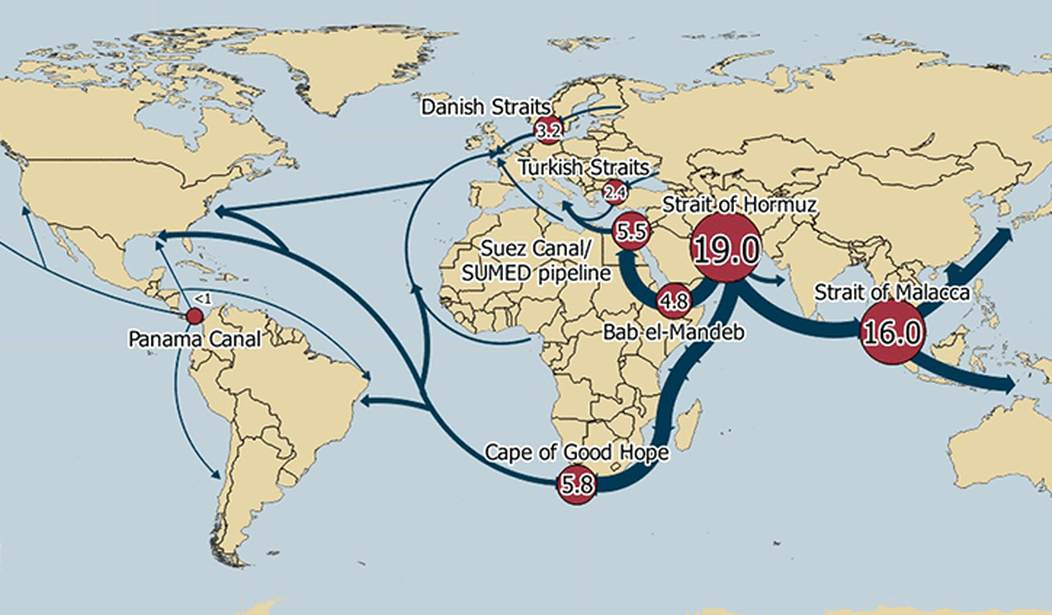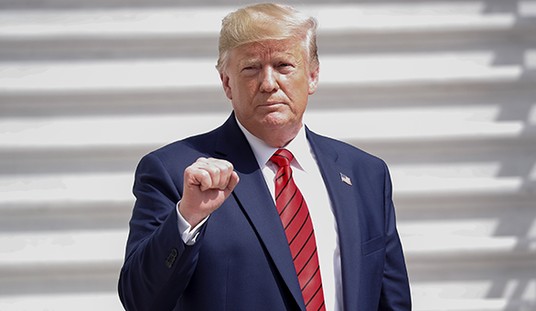The Trump administration’s willingness to take on Iran, China and Russia — in the economic and diplomatic sphere at least — raises the question of whether even low-intensity conflict can eventually lead to a crisis. The apparent abolition of war in our globalized world has been replaced by what Austin Bay called in his book Cocktails from Hell “a hazardous form of peace”. The danger is that such conflicts may boil over. The first flashpoint may be Iran.
Iran’s Revolutionary Guard shot down a U.S. drone Thursday amid heightened tensions between Tehran and Washington over the collapsing nuclear deal with world powers …
Lt. Gen. Joseph Guastella, commander of U.S. Air Forces Central Command, told reporters at the Pentagon that Iranian reports that the drone was shot down over Iran “are categorically false.” He said the drone was flying in international airspace over the Strait of Hormuz and Gulf of Oman near the area of the recent tanker attacks when it was shot down. He claimed the Guard fired a surface-to-air missile at the drone from a location near Goruk, Iran.
The shootdown, which occurred near the Gulf of Hormuz, close to where a number of tankers were recently attacked, comes on the heels of increasing U.S. economic sanctions on Iran. It is Tehran’s most significant attack on U.S. military assets since killing 600+ U.S. troops in Iraq. The most natural historical parallel is the mining of the frigate USS Samuel B. Roberts in 1988, which led to Operation Preying Mantis, in which “U.S. air and surface units had sunk, or severely damaged, half of Iran’s operational fleet.” What’s different now is that Iran may want to provoke a massive escalation by the U.S. to escape slowly being strangled in the low-intensity conflict game.
Iranian crude exports have fallen sharply in May to around 400,000 barrels per day (bpd), tanker data showed and two industry sources said, after the United States tightened the screws on Tehran’s main source of income.
The United States reimposed sanctions on Iran in November after pulling out of a 2015 nuclear accord between Tehran and six world powers. Aiming to cut Iran’s sales to zero, Washington this month ended sanctions waivers for importers of Iranian oil.
They can’t win unless they try something new. The upper limit to Iranian escalation has traditionally been defined as Tehran closing the Straits of Hormuz. “Escalating tensions between Iran and the United States have raised the prospect of a military clash in a waterway vital for global oil supplies. Close to one-fifth of the world’s crude oil is supplied by Gulf countries that rely on unimpeded travel through the Strait of Hormuz, which is twenty-one miles wide at its narrowest point and abuts southern Iran, to access world oil markets.” The problem is normally posed in terms of U.S. difficulty in keeping it open. “Securing the shipping lanes in a region as large and important as the Persian Gulf is no easy feat. How does the U.S. do it, especially if Iran is determined to harass tankers?”
But that ignores the fact that Iran only gains by raising tensions in the Strait, upping the price of oil. But actually closing the Strait would be political, if not national suicide. Most of the oil passing through Hormuz (about 11/17ths) is bound for the Straits of Malacca en route to China, Japan and Korea. If Tehran actually closed the Straits, by mining it, for example, they would essentially be blockading China.
Iran itself appears to want a tollbooth, not absolute closure so it can avoid the invidious position of blockading potential allies. The head of the navy of Iran’s Revolutionary Guards, Gen. Alireza Tangsiri, described their intentions in this Reuters report.
“We can ensure the security of the Persian Gulf and there is no need for the presence of aliens like the U.S. and the countries whose home is not in here,” he said in the quote, which appeared in English translation on Tasnim.
He added: “All the carriers and military and non-military ships will be controlled and there is full supervision over the Persian Gulf. Our presence in the region is physical and constant and night and day.”
Interestingly Trump seems willing to let the Iranian threat serve as a goad for international action. “President Donald Trump said Friday that if Iran were to block the Strait of Hormuz, “it’s not going to be closed for long,” but he did not elaborate on whether the United States had an obligation to keep open the international shipping gateway, which is critical to the oil industry.” (Emphasis mine). With the U.S. nearly a net exporter of oil the pressure is actually on Asia to keep Hormuz open. The Nikkei Asian Review wrote:
U.S. President Donald Trump … has indicated he won’t necessarily jump in to protect international oil supplies from the Middle East if they are under threat from the Islamic Republic.
The position, articulated by Trump in an interview with Time magazine on June 17, should not come as a surprise … As Trump spelt out in the interview, the U.S. is no longer as dependent on oil from the Middle East as it was, thanks to burgeoning domestic production. …
The argument that the Gulf of Oman, where six oil tankers were attacked in the space of a month over May and June, is not as strategic to the U.S. as it is to countries in Asia, cannot be faulted. The U.S.’s crude import volumes, including those from the Middle East, have plummeted since its shale renaissance sent domestic output rocketing from around 2012.
Meanwhile, China, India, Japan and South Korea, Asia’s four largest oil consumers, secure up to half their crude requirements from the Middle East. If seaborne shipments of oil from that region — a majority of which pass through the narrow Strait of Hormuz adjoining Iran — are disrupted, it would be nothing short of disastrous for these countries.
U.S. energy independence has given Washington a far more powerful option than merely reprising an updated version of Preying Mantis. From a position of self-sufficiency, Trump might use the prospect of oil disruption to organize “international convoys” among the energy dependent as a kind of FONOPS in the Gulf. Or it could harness the fears of the Asian giants to add teeth to its sanctions regime against Iran. Either outcome would be both devastating to Tehran yet nonkinetic.
As someone noted on Twitter “our calculus changed on closing the Straits, not just due to domestic fracking output, but because China now consumes vast amounts of ME oil. 20 years ago, closing the straits hurt mainly our Asian allies. Now, it hurts our rival.”
The answer the question of whether even low-intensity conflict can eventually lead to a crisis appears to be a resounding “yes.” What was underappreciated, except perhaps by U.S. strategists, was that the crisis could be manifested as economic rather than military.
Follow Wretchard on Twitter
Tipjar at wretchard.com
Support the Belmont Club by purchasing from Amazon through the links below.
Books:
The Compound Effect, by Darren Hardy. An easy-to-use, step-by-step operating system that shows us how to multiply our success, chart our progress, and achieve what our heart desires. A book of success strategies.
The Beatles: Tune In (Extended Special Edition), by Mark Lewisohn. A collector’s item, this extended edition in two volumes features hundreds of thousands of words of extra material, as well as many extra photographs. It is the complete, uncut and definitive biography of the Beatles’ early years, from their family backgrounds through to the cusp of their breakthrough at the end of 1962.
The Social Media Upheaval, by Glenn Harlan Reynolds. The book looks at the up- and downsides of social media and proposals for its regulation. Reynolds offers a fix that respects free speech while reducing social media’s toll.
Making the Corps, by Thomas E. Ricks. The author follows the 63 raw recruits of recruit platoon 3086, from their hometowns to Parris Island, through boot camp, and into their first year as Marines. As three drill instructors fight for the hearts and minds of these young men, a larger picture emerges of the growing gulf that divides the military from the rest of America.
For a list of books most frequently purchased by readers, visit my homepage.
Did you know that you can purchase some of these books and pamphlets by Richard Fernandez and share them with your friends? They will receive a link in their email and it will automatically give them access to a Kindle reader on their smartphone, computer or even as a web-readable document.
The War of the Words, Understanding the crisis of the early 21st century in terms of information corruption in the financial, security and political spheres
Rebranding Christianity, or why the truth shall make you free
The Three Conjectures, reflections on terrorism and the nuclear age
Storming the Castle, why government should get small
No Way In at Amazon Kindle. Fiction. A flight into peril, flashbacks to underground action.
Storm Over the South China Sea, how China is restarting history in the Pacific.










Join the conversation as a VIP Member